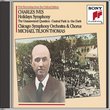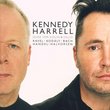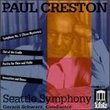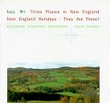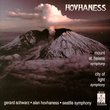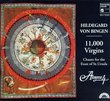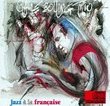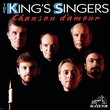| All Artists: Kurt Weill, John Eliot Gardiner, Anne Sofie von Otter, Bengt Forsberg, Hannover North German Radio Orchestra, Karl-Heinz Lampe, Frederick Martin, Christfried Biebrach, James Sims Title: Anne Sofie von Otter - Speak Low ~ Songs by Kurt Weill / Gardiner Members Wishing: 0 Total Copies: 1 Label: Deutsche Grammophon Release Date: 3/14/1995 Genres: Pop, Classical Styles: Vocal Pop, Opera & Classical Vocal, Ballets & Dances, Ballets Number of Discs: 1 SwapaCD Credits: 1 UPCs: 028943989428, 028943989428 |
Search - Kurt Weill, John Eliot Gardiner, Anne Sofie von Otter :: Anne Sofie von Otter - Speak Low ~ Songs by Kurt Weill / Gardiner
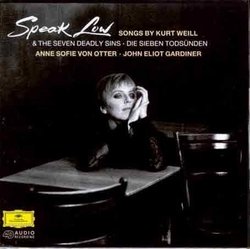 | Kurt Weill, John Eliot Gardiner, Anne Sofie von Otter Anne Sofie von Otter - Speak Low ~ Songs by Kurt Weill / Gardiner Genres: Pop, Classical Kurt Weill's ballet with songs is one of this century's greatest theatrical works. It has all the wit and melodic appeal of The Threepenny Opera and social conscience of Mahagonny, but more warmth and musical sophisticatio... more » ![header=[] body=[This CD is available to be requested as disc only.]](/images/attributes/disc.png?v=430e6b0a) ![header=[] body=[This CD is available to be requested with the disc and back insert.]](/images/attributes/disc_back.png?v=430e6b0a) ![header=[] body=[This CD is available to be requested with the disc and front insert.]](/images/attributes/disc_front.png?v=430e6b0a) ![header=[] body=[This CD is available to be requested with the disc, front and back inserts.]](/images/attributes/disc_front_back.png?v=430e6b0a) |
Larger Image |
CD DetailsSynopsis
Amazon.com Kurt Weill's ballet with songs is one of this century's greatest theatrical works. It has all the wit and melodic appeal of The Threepenny Opera and social conscience of Mahagonny, but more warmth and musical sophistication than either. It's also all over with in about 40 minutes. Some critics believe the piece was intended as a sort of love poem to Weill's wife, Lotte Lenya; given the tenderness of much of the music, it's hard to disagree. Lenya herself recorded the piece in the 1950s (a recording recently reissued by Sony) and this very much newer performance is welcome particularly for Anne Sofie von Otter's highly intelligent and musical way with the text. The other songs, from both Weill's Berlin and Broadway periods, make the perfect filler. --David Hurwitz Similarly Requested CDs
|
CD ReviewsExcellent Weill Alternative to Lenya and Lemper B. Marold | Bethlehem, PA United States | 09/28/2005 (5 out of 5 stars) "`Speak Low Songs by Kurt Weill' is a great addition to the performances of Herr Weill's works by the prominent mezzo-soprano, Anne Sofie Von Otter. I have listened to many performances by Weill specialists from the archetype, Weill's wife, Lotte Lenys, for whom many of the songs were originally written to Ute Lemper and Gisela May, who lean heavily toward Lotte Lenya's gravel-voiced interpretation of Weill's songs. Anne Sofie Von Otter breaks with this tradition and gives us what are easily the sweetest interpretations of Weill's songs from both his German and English works, which I have heard anywhere. The flagship performance on this disc is `Die Sieben Todsunden' (`The Seven Deadly Sins') which was a cycle of songs to be sung on the stage, accompanied by dances done by a second performer. This takes the first nine (9) tracks and is at least as good as what I have heard from Weill specialist, Lemper. This album is the first time I have noticed that there are two versions of this work, and that Ms. Von Otter is performing the version for soprano. But, I think the most moving performances come later, especially in von Otter's performances of the three numbers from `Happy End', `Bilbao-Song', `Surabaya-Johnny', and `Das Lied von der harten Nuss' (Song of the Big Shot). I have heard these done by many people, but never so sweetly. These numbers are so lovingly performed that I insist that you ignore the fact that the lyrics are in German. The accompanying booklet gives English translations, which I simply ignore and enjoy the musical talent with no filter. My understanding German has nothing to do with this, as I do the same with French, which I can just barely make out. Kurt Weill may not be the most important influence on American musical theatre in the 20th century, but he is easily in the top five, along with the Gershwins, Irving Berlin, Richard Rodgers and collaborators, and Cole Porter. Ms. Von Otter is ably accompanied on this disk by her favorite pianist, Bengt Forsberg plus the Norddeutch Rundfunk orchestra directed by John Eliot Gardiner. While I really like her selection on this disk, the collection makes me wish Ms. Von Otter would do some more Weill and spend less time hanging out with Elvis Costello, but that's a different story. " Intelligent reading from both singer and conductor Sean | LOOK | 01/27/2005 (4 out of 5 stars) "THE SEVEN DEADLY SINS is such a brilliant mini-masterpiece (and, to me, the pinnacle of the Brecht-Weill years) that it is hard to screw up. It is a testament to the staying power of this work (and to the brilliance of Weill's music in general) that it can be performed by the likes of Lotte Lenya, Julia Migenes, Ute Lemper, Judy Kaye, Marianne Faithfull, Teresa Stratas, and -- as here -- Anne Sofie von Otter, and STILL work... and EACH of these women are totally successful in the piece on their own terms. Here, Anne Sofie von Otter gives us an intelligent (and highly musical) rendering of the text, keeping the musical line very much intact. She sings with vibrato at times, and then will turn around and use straight-tones at moments where it is dramatically appropriate to do so. She balances the performance well, shifting gears between cool detachment (which she is often criticized for) and impassioned outbursts (which her critics often fail to notice). John Eliot Gardiner surprised me with how easily this music seemed to come to him, especially as he seems to be a man more at home with "Period-Instrument-Mozart" than highly charged 20th century works. However, his reading of "The Rake's Progress" by Stravinsky was totally staggering. For example, his choice beginning the climactic moment of the score ("Envy") as slowly as he does caught me very much off guard at first, and I didn't really care for it at all. However, with each successive listen, I find myself "getting" this choice more and more. Finally, the "filler." As to be expected, she is more successful with the European material than she is with the songs from Weill's Broadway years. But this is the case with about 99.9% of all opera singers who try to sing Weill's Broadway scores. You will never hear any singer give "Je ne t'aime pas" a more hauntingly beautiful, passionately intense performance than Anne Sofie von Otter. Truly, the ultimate interpretation of one of my favorite Weill songs. "Nannas Lied," "Der Abschiedsbrief," and the HAPPY END selections. However, "My Ship" and "One Life to Live" seem to fail at catching fire -- the former because it is marred by an attempt to sound like a "pop singer," the latter because von Otter sings English better than native speakers (she knows where the ACTUAL emphasis in the phrase "nothing: the thing is to have fun" goes, as opposed to where Ira Gershwin placed it). I also -- surprisingly enough -- don't care for her performance of "Schickelgruber" -- she just seems totally lost to me. (I really think that this song is foreign territory to 'legit' sopranos and mezzos -- I don't even care for the Stratas rendition.) Just when I thought I would have to suffer through another bad batch of "opera-crossover," Anne Sofie turned around and surprised me by giving highly successful performances of the numbers from ONE TOUCH OF VENUS (especially on "I'm Stranger Here Myself"). All in all, a worthy purchase: highly recommended to all fans of THE SEVEN DEADLY SINS and Kurt Weill enthusiasts." Everything is right but the style Santa Fe Listener | Santa Fe, NM USA | 09/24/2005 (3 out of 5 stars) "Weill and Brecht defined a nasty age with nasty art, writing some of the grittiest satire in the history of music. In this CD von Otter misses that edge, skirts all the dangerous, sleazy implications, and ultimately sounds too much the opera singer slumming it for an hour. Her earnestness is no subtitute for the right period style, a la Lotte Lenya."
|


